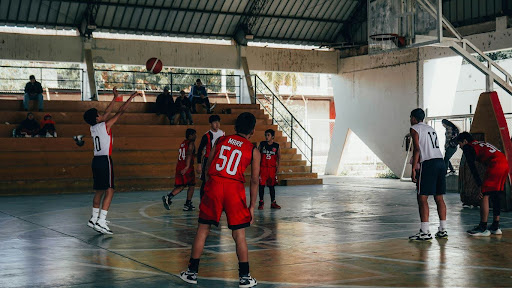Betting on Olympic basketball qualifiers might seem straightforward, but there’s a bit more to it than just picking your favorite team. Understanding the nuances of these games can really make a difference in your betting success. It’s not quite the same as watching your usual NBA games, and that’s where knowing what you’re getting into pays off.
Why Understand How to Bet on Olympic Games Basketball Qualifiers
Think about it: the rules are different, the players might be in unfamiliar roles, and the stakes are incredibly high for the nations involved. This isn’t just about a regular-season game; it’s about a spot in the Olympics.
Here are a few things to keep in mind:
- FIBA vs. NBA Rules: The court size, game length, and foul rules all differ. For example, FIBA games have 10-minute quarters, not 12, and the three-point line is closer. These small changes can affect how teams play and how scores add up.
- Team Rosters and Form: National teams often have rosters that change from year to year. You can’t always rely on past performance or how players do in their club leagues. Keeping up with who’s playing and how they’ve been performing recently is key.
- Tournament Format: Knowing how the qualification process works, including group stages and knockout rounds, helps you understand the pressure and potential matchups.
Betting on international basketball, especially during qualification periods, requires a different approach than betting on domestic leagues. The dynamics are unique, and a little extra knowledge can go a long way toward making informed wagers.
Getting a handle on these aspects can help you spot opportunities that others might miss. It’s about being prepared and knowing what factors influence the game. For instance, understanding how betting odds work is a good starting point for any bettor, but applying that knowledge to the specific context of Olympic qualifiers is where the real advantage lies.
Tournament Format & Qualification Structure for Betting on Olympic Games Basketball Qualifiers
Understanding how teams get to the Olympics is pretty important if you’re looking to place some bets. It’s not as straightforward as just showing up. The path to Olympic basketball glory involves several stages, and knowing this structure can really help you spot betting opportunities.
Generally, the qualification process starts with teams competing in continental championships or specific Olympic Qualifying Tournaments. These events serve as the main gateways for national teams to earn their spot. For example, the FIBA Asia Cup 2025 will feature 16 teams, with the top performers moving on to further stages. The stakes are high because there are only so many spots available for the Games.
Here’s a simplified look at how it often works:
- Continental Championships: These are major tournaments like the FIBA World Cup, EuroBasket, and FIBA AmeriCup. Teams compete not only for continental titles but also for direct qualification berths to the Olympics. The number of spots allocated varies by region.
- Olympic Qualifying Tournaments (OQTs): For teams that don’t qualify directly through continental events, there are usually OQTs. These are separate, intense tournaments where the remaining slots are decided. Teams that perform well here secure their place.
- Host Nation Spot: The host nation of the Summer Olympics automatically receives a spot in the basketball tournament, simplifying its qualification path.
The format within these tournaments is also key. You’ll often see a group stage followed by a knockout phase. In the group stage, teams play round-robin matches within their group. Point differential can become a significant factor if teams end up tied in the standings, which can influence betting on spreads.
The journey to the Olympics is a long one, involving multiple tournaments and stages. Teams that have navigated these tough qualification paths often show a certain resilience and quality that can be telling when they finally reach the main event. Betting on teams that have proven themselves through these rigorous processes might be a smart move.
Knowing which teams are coming through the OQTs versus those who qualified directly through a major championship can also offer insight. Teams that barely scraped through qualifying might be more vulnerable than those who dominated their continental competition. It’s all about understanding the journey each team took to get to this point.
Key Factors to Consider for Betting on Olympic Games Basketball Qualifiers
When you’re looking to place bets on the Olympic basketball qualifiers, there are a few things you really need to keep in mind. It’s not quite the same as betting on your usual NBA games, so paying attention to the details can make a big difference. Understanding the specific rules and how they differ from the NBA is a good starting point.
Here are some of the main things to look at:
- Team Rosters and Player Availability: International teams can change a lot from one tournament to the next. Keep an eye on who’s actually playing. Sometimes, NBA players might not be available, or a team might rely heavily on players from their domestic leagues or European leagues. Knowing who’s on the court is half the battle.
- Recent Form and Momentum: How has a team been playing lately? Are they coming off a strong performance in a continental championship, or have they been struggling? Looking at recent results, especially in competitive matches, can give you a good idea of their current strength.
- Home Court Advantage (or Lack Thereof): While Olympic qualifiers aren’t always played in a neutral venue, sometimes playing in front of a home crowd can give a team a noticeable boost. Conversely, playing in a hostile environment can affect a team’s performance.
- Coaching and Tactics: Different coaches have different styles. Some might focus on fast-paced offense, while others prefer a more defensive approach. Understanding the coaching philosophy can help you predict how a team will play against a specific opponent.
- FIBA vs. NBA Rules: This is a big one. FIBA games have shorter quarters (10 minutes instead of 12), a slightly smaller court, and the three-point line is closer. These differences can really change how a game flows and how certain players perform. For instance, a player who is a great shooter in the NBA might be even more effective with the closer FIBA line. You can find more on FIBA rules.
It’s easy to get caught up in the names you recognize from the NBA, but international basketball often features players who are stars in their own right on the global stage. Don’t underestimate players who might not be household names in the US but are dominant forces in their respective leagues or national teams.
- Travel and Fatigue: For teams traveling long distances or playing in quick succession, fatigue can become a factor. This is especially true for players who might be juggling club commitments with national team duties. Keep an eye on schedules and travel plans if that information is available.
Key Factors to Consider for Betting on Olympic Games Basketball Qualifiers

When you’re looking at Olympic basketball qualifiers, the roster is a huge deal. It’s not just about who’s on the team, but who’s actually playing and how they’re doing right now. Think about it, a team stacked with talent on paper can fall apart if key players are out or just not playing well. Injuries can really mess things up, and you’ve got to keep an eye on that. For example, Serbia still looks strong even with Bogdan Bogdanovic out, but it’s a big change.
Team form is another thing. Are they winning their recent games? How are they performing against similar competition? A team that’s been on a winning streak heading into qualifiers is usually a safer bet than one that’s been struggling. It’s not like the NBA, where you can look at 82 games; these international tournaments are shorter, so recent performance matters a lot.
Here’s a quick rundown of what to check:
- Player Availability: Who is actually suiting up? Are there any last-minute scratches or players dealing with nagging injuries?
- Recent Results: How has the team performed in their warm-up games and previous qualifying matches? Look for trends, not just isolated wins or losses.
- Player Roles: Does a player who is a role player in the NBA suddenly become a star in FIBA play? Think about Ricky Rubio’s scoring outburst in Tokyo. You need to understand what role they’ll be asked to fill.
It’s easy to get caught up in a player’s NBA stats, but that doesn’t always translate to international play. Different rules, different team dynamics, and different expectations mean players can perform in ways you might not expect. Always check the latest team news before placing any bets.
Don’t just assume a team will perform the same way they did last year or even a few months ago. Rosters change, players get injured, and team chemistry evolves. You need to be up-to-date on all of this to make smart betting choices.
Rule Differences: FIBA vs NBA & Their Betting Implications
When you’re looking to place bets on Olympic basketball qualifiers, it’s really important to know that the game isn’t played exactly like it is in the NBA. FIBA (the international governing body) has its own set of rules, and these differences can actually have a big impact on how games play out and, by extension, how you should approach betting. It’s not just a minor tweak; some players have even said it feels like a totally different sport.
One of the most noticeable differences is the game’s pace and structure. FIBA games are shorter, with four 10-minute quarters, compared to the NBA’s 12-minute quarters. While the shot clock is the same at 24 seconds, that shorter overall game time means every possession counts a bit more. Also, the court itself is slightly smaller in FIBA, and the three-point line is closer. This can make the game feel more congested in the paint and might slightly favor teams with strong interior play.
Fouls are another area where things diverge. In the NBA, a player is disqualified after six personal fouls or two technical fouls. FIBA, however, has a stricter limit: five total fouls (personal and technical combined) will send a player to the bench. This means players have to be more careful, and coaches might manage their star players’ minutes differently to avoid foul trouble. The bonus situation also differs; in FIBA, the bonus is typically triggered after a team commits more than four fouls in a quarter, and all fouls count towards it.
| Rule Aspect | NBA | FIBA |
| Quarter Length | 12 minutes | 10 minutes |
| Foul Limit | 6 personal fouls / 2 technicals | 5 total fouls (personal + technical) |
| 3-Point Line | Further away | Closer |
| Goaltending | Cannot touch the ball on a downward arc | Cannot touch the ball on a downward arc; can touch once it hits the rim |
| Defensive 3-Seconds | Yes | No |
Officiating styles can also vary. NBA referees often call contact more strictly, while FIBA officials might allow a bit more physicality. This can lead to different game flows and scoring outputs. You also can’t forget about goaltending rules; in FIBA, once the ball hits the rim, it’s fair game to tap in, which isn’t the case in the NBA. The absence of defensive three-second violations in FIBA also changes how teams can pack the paint.
Understanding these rule nuances is not just trivia; it directly influences team strategies, player performance, and ultimately, the betting markets. For instance, a team that relies heavily on drawing fouls in the NBA might find it harder to do so under FIBA rules, potentially impacting their scoring. Conversely, a dominant big man might be even more effective with the slightly different goaltending rules and less defensive pressure in the paint.
When you’re looking at odds for Olympic qualifiers, keep these differences in mind. A team that looks like a strong bet based on its NBA performance might not translate directly. It’s about adapting your analysis to the specific ruleset of international basketball. For more on how to find good bets, check out Casino Bets Odds. Players who might be role players in the NBA can sometimes become high-usage stars in FIBA, and vice versa. This dynamic is something to watch closely when researching teams and players for your bets.
Bet Types & Markets in Olympic Qualifiers
When you’re looking to place some bets on the Olympic basketball qualifiers, you’ll find a bunch of different ways to wager. It’s not just about picking the winner, though that’s a big one. Let’s break down some of the common bets you’ll see.
- Moneyline: This is the most basic bet. You’re simply picking which team you think will win the game outright. If they win, you win. Simple as that.
- Point Spread: This is where things get a bit more interesting. The sportsbook sets a margin of points, and you bet on whether the favorite will win by more than that spread, or if the underdog will keep it closer (win outright or lose by less than the spread). It adds a layer of strategy, especially when you have a strong favorite.
- Totals (Over/Under): Here, you’re not worried about who wins. Instead, you’re betting on whether the total combined score of both teams will be over or under a number set by the bookmaker. Think of it as betting on whether the game will be a high-scoring shootout or a defensive grind.
- Parlays: Want to try for a bigger payout? Parlays let you combine multiple bets into one. The catch is, all your individual picks have to be correct for the parlay to pay off. It’s risky, but the potential rewards can be high.
- Futures: These are bets placed on outcomes that are further down the line, like which team will win the entire qualifying tournament or even which country will medal in the Olympics. You’re looking at the big picture with these.
- Prop Bets: These are bets on specific occurrences within a game that don’t necessarily affect the outcome. For example, you might bet on which player will score the first basket or if a certain player will get a certain number of assists. They can add some fun, specific action to a game.
It’s important to remember that FIBA rules, which govern Olympic basketball, differ from NBA rules. These differences, like shorter game times and different foul rules, can impact game flow and scoring, which in turn affects how you might bet on totals or spreads.
When you’re comparing odds, you’ll often see them presented in different formats, like American, Decimal, or Fractional. Understanding these is key to spotting value. For instance, a team with negative odds is the favorite, meaning you have to bet more to win a smaller amount. Positive odds mean they’re the underdog, and a winning bet nets you more than your initial stake.
Odds Comparison & Value Betting Strategies for Betting on Olympic Games Basketball Qualifiers
When you’re looking to place bets on Olympic basketball qualifiers, just looking at one sportsbook’s odds isn’t going to cut it. You’ve got to shop around. Different bookies will have different ideas about who’s likely to win or cover the spread, and that’s where you can find some real value. It’s like finding a sale at your favorite store – you want to get the best price, right? For example, one site might have Team A at -110 odds to win, while another has them at -105. That small difference can add up over time. Finding these discrepancies is key to making smart bets.
To really get ahead, you need to compare the odds across multiple platforms. Think of it like this:
- Identify the Matchup: Pick the game you’re interested in.
- Check Multiple Sportsbooks: Visit at least three different betting sites.
- Compare Moneyline Odds: See which site offers the best payout for a straight win.
- Compare Point Spreads: Look for the most favorable spread and odds.
- Compare Totals (Over/Under): Find the best line for your prediction.
Beyond just comparing, you’re looking for ‘value’. Value betting means finding odds that you believe are higher than the actual probability of an event happening. If you think a team has a 60% chance of winning, but the odds imply only a 50% chance, that’s a value bet. This requires a good grasp of the teams involved, their recent performances, and any other factors we’ve discussed.
It’s not just about picking winners; it’s about finding situations where the odds don’t quite match reality. This is where you can find some really interesting opportunities, especially in international tournaments where information might be a bit more scattered than in, say, the NBA. You might find that a team that’s been playing well internationally, but isn’t a household name, is being undervalued by the oddsmakers. Betting on these situations can lead to better returns. Remember, the goal is to find odds that are favorable compared to the true likelihood of the outcome. This is how you can potentially find some great betting opportunities.
Betting on international basketball qualifiers can feel a bit like a treasure hunt. You’re sifting through information, comparing different odds, and trying to spot where the bookmakers might have missed something. It takes patience and a bit of digging, but finding that one bet where the odds seem too good to be true can be really rewarding.
Risk Management & Bankroll Strategies for Betting on Olympic Games Basketball Qualifiers

When you’re looking to place bets on Olympic basketball qualifiers, it’s super important to have a solid plan for your money. Think of it like this: you wouldn’t go into a big game without a strategy, right? The same goes for your betting funds. The goal here isn’t to win big overnight, but to stay in the game long enough to actually see some returns.
First off, figure out how much you’re willing to bet. This is your bankroll. Never bet more than you can afford to lose. Seriously, this is the golden rule. Once you’ve set that amount, decide on a unit size. A common approach is to bet 1-3% of your total bankroll on any single wager. This helps protect you when you hit a losing streak, which, let’s be honest, happens to everyone.
Here’s a simple way to think about unit sizing:
- Small Unit: 1% of your bankroll. Good for when you’re unsure or just starting.
- Standard Unit: 2% of your bankroll. Your go-to for most bets.
- Large Unit: 3% of your bankroll. Use this sparingly for bets you feel very confident about.
Let’s say your bankroll is $1000. A 1% unit would be $10, a 2% unit $20, and a 3% unit $30. This structure helps keep your emotions in check. You won’t be tempted to chase losses by suddenly betting huge amounts after a bad beat.
It’s easy to get caught up in the excitement of international basketball, especially when big names are involved. However, sticking to a disciplined approach with your betting funds is what separates casual bettors from those who see consistent, albeit slow, growth over time. Protect your capital first and foremost.
Another key aspect is avoiding what’s called ‘chasing losses.’ If you lose a bet, don’t immediately increase your bet size on the next game to try and win it all back. This is a fast track to depleting your bankroll. Instead, stick to your predetermined unit size. You can find more on effective NBA betting strategies that apply here, too.
Finally, keep track of your bets. A simple spreadsheet can do wonders. Record the game, the bet type, the stake, the odds, and the outcome. This data helps you see what’s working and what’s not, allowing you to adjust your strategy over time. It’s all about making informed decisions, not just guessing.
Common Mistakes to Avoid in How to Bet on Olympic Games Basketball Qualifiers
Betting on Olympic basketball qualifiers can be a bit tricky if you’re only used to the NBA scene. It’s easy to fall into a few traps that can cost you money. Let’s talk about some of the common slip-ups to steer clear of.
One big mistake is assuming that because a player is a star in the NBA, they’ll perform the same way in qualifiers. International teams often ask players to fill different roles. For example, a player who’s a role player in the NBA might become a primary scorer for their national team. You can’t just look at their NBA stats and expect the same output.
Another pitfall is relying too much on past results. Rosters for national teams change a lot from one tournament to the next. A team that looked strong two years ago might be completely different now, with new players and different chemistry. Don’t bet based on old data without checking the current lineup.
Here are a few more things to watch out for:
- Ignoring FIBA Rules: The game is played differently. The court is smaller, the three-point line is closer, and foul rules can vary. These differences matter and can affect game flow and scoring.
- Overvaluing Big Names: Sometimes, less-known players on international teams can be incredibly effective. Don’t automatically bet against a team just because they don’t have NBA superstars.
- Underestimating Team Form: Just like in any sport, teams go through hot and cold streaks. Look at recent performance in other qualifying matches or tournaments, not just historical reputation.
It’s tempting to think you know a team or player because you’ve seen them play in the NBA or a previous international event. However, the context of Olympic qualifiers is unique. Player roles, team dynamics, and even the rules of the game can shift, making direct comparisons misleading.
Finally, don’t forget about injuries. A key player being out can drastically change a team’s chances. Always check the latest injury reports before placing your bets. Being aware of these common mistakes can help you make smarter bets and avoid unnecessary losses.
When betting on Olympic basketball qualifiers, it’s easy to make simple errors. For instance, not understanding the teams or overlooking key player stats can lead to bad bets. To get the most out of your wagers, make sure you’re informed. For more tips on how to bet smartly, check out our guide on [avoiding common betting mistakes]. Visit our website today to learn more and place your bets!
Frequently Asked Questions
What makes betting on Olympic basketball qualifiers different from betting on NBA games?
Betting on Olympic qualifiers differs from the NBA because international teams have different rules, like shorter quarters and a closer three-point line. Also, player roles can change significantly when they play for their country compared to their NBA teams. You can’t just assume players will perform the same way.
How important is it to understand FIBA rules when betting on Olympic qualifiers?
It’s very important. FIBA rules, like game length and foul calls, are not the same as NBA rules. Knowing these differences can help you make better bets because they affect how games are played and how teams perform.
Should I pay attention to player injuries and team form before placing a bet?
Yes, absolutely. Just like in any sport, injuries to key players can greatly affect a team’s chances. Also, looking at how a team has been playing recently, their ‘form,’ can give you clues about whether they are likely to win or lose.
What are some common types of bets I can make on Olympic basketball qualifiers?
You can make several types of bets. The most common are moneyline bets (who wins the game), spread bets (winning by a certain amount), and totals bets (over or under a set number of points). There are also prop bets, which are bets on specific player or team actions.
How can I find good value when betting on Olympic qualifiers?
Finding value means looking for odds that you think are better than they should be. This often involves doing more research than other bettors. Compare odds from different sportsbooks to see where you can get the best deal. Sometimes, less popular teams or players might have surprisingly good odds.
What’s a good strategy for managing my money when betting on Olympic qualifiers?
A good strategy is to only bet a small percentage of your total betting money, called your bankroll, on any single game. This way, if you have a few losing bets, you won’t run out of money quickly. It helps you stay in the game longer and avoid making risky bets when you’re losing.
Daniel Chase is a seasoned casino analyst and iGaming writer with over 10 years of experience in the online gambling industry. He specializes in game strategy, casino odds, and player-focused reviews. Daniel is passionate about helping players make smarter decisions through transparency, real data, and honest insight.











